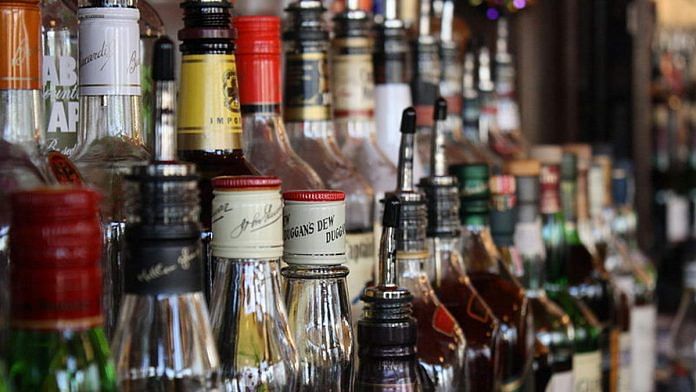Patna: The Nitish Kumar government, which brought prohibition laws to Bihar, is now preparing to make glass bangles out of seized liquor bottles, in what’s being seen as an attempt to woo women voters.
The state is already working on such an initiative through its Rural Livelihoods Promotion programme, known locally as JEEViKA, Bihar Excise Commissioner B. Kartikey Dhanji told ThePrint.
Funded by the World Bank, JEEViKA is a rural social and economic empowerment programme that comes under Bihar’s rural development department.
Liquor bottles impounded during raids were earlier crushed and treated as garbage, said Dhanji. “But now we’ll give these (bottles) to JEEViKA workers who have been trained in bangle-making. The programme will set up a factory for this. We have already earmarked Rs 1 crore. If the plan succeeds, we’ll consider increasing the number of factories.”
However, not everyone is enthusiastic about the idea. Industrialists, who say that the 2016 liquor ban hit the hospitality industry hard, are wondering if the move is economically viable.
“The move may sound innovative. But there are many factors to be considered,” Satyajit Singh, president of the Bihar branch of the PHD Chamber of Commerce and Industry, told ThePrint.
“There are established glass bangle factories in Faizabad, Mumbai, and Hyderabad. Glass constitutes 75 per cent of glass bangles. [But] there are other materials, such as soda and limestone. Will the government provide the factory with these?” he asked.
“Will the seizure of illegal liquor bottles be enough to run the factory and [will it] be economically viable? And how will JEEViKA workers compete with established glass bangle makers from outside the state — both financially and quality-wise?” Singh further asked.
Some are sceptical about whether the policy decision will even come to fruition.
This could be like the time when Chief Minister Nitish Kumar’s government promised to introduce neera — palm nectar that ferments into sweetened toddy — an industrialist who didn’t want to be named told ThePrint.
“The chief minister had spoken of the health benefits of neera but the plan never saw the light of day. Similarly, this factory also will be a publicity stunt,” he further said.
Also Read: Public taboo, private brew: Hooch to foreign booze, ‘dry’ Gujarat has never had alcohol shortage
Bihar’s liquor prohibition: Rising arrests & overcrowded jails
Introduced on 5 April 2016 — less than six months after Nitish Kumar’s government was re-elected for the fourth time — the Bihar Prohibition and Excise Act, 2016, imposed a total ban on alcohol in the state.
Despite the law, however, figures on the quantity of liquor being seized in Bihar are staggering. In August alone, the state impounded 3.7 lakh litres of liquor, data from the state’s excise department shows. The same month saw over 1 lakh raids being conducted as the drive against alcohol intensified, data shows.
“Just imagine the actual quantity of liquor entering Bihar,” another official of the state’s excise department told ThePrint on condition of anonymity.
After being pulled up repeatedly by both the Supreme Court and Patna High Court over its prohibition law causing overcrowding of the state’s jails, the Bihar government announced earlier this year that it was easing its law.
In March, the Bihar assembly passed a Bill amending the prohibition Act. Called the Bihar Prohibition and Excise (Amendment) Bill, 2022, the law says people caught consuming liquor will now have to pay a fine before a magistrate and won’t be sent to jail.
The amendment is still awaiting implementation after the Patna High Court voiced its reservations about judicial power being vested in officials designated as special executive magistrates in districts and subdivisions.
As a result, the old system of arrest continues — data from the excise department shows that in August alone, 30,000 persons were arrested for violating liquor laws.
The liquor prohibition policy has been the subject of many controversies — chief among them the allegation that the law has choked up the state’s judicial processes.
In December 2021, a team of Bihar police officers reportedly entered a woman’s bedroom five days after her wedding in Patna in search of liquor bottles.
In January this year, teachers held protests in Bihar after the Nitish government passed an order tasking them with tipping off authorities regarding the sale and consumption of liquor.
“Liquor law violations have led to overcrowding of jails in Bihar. There are around 1.5 lakh people in Bihar jails for the violations. Most of them belong to the lower and downtrodden classes of society who can’t bribe their way out of prison. I appeal to the Bihar government to give a one-time waiver to the persons in jail,” Sushil Kumar Modi, Bihar’s former deputy chief minister and a BJP leader, told ThePrint, but insisted that his party had always supported liquor prohibition in the state.
The BJP was an ally of Nitish Kumar’s Janata Dal (United) until the chief minister broke ties with it last month to join hands with the Rashtriya Janata Dal (RJD).
The RJD too has criticised the state’s liquor policy in the past — RJD leader Tejashwi Yadav, now Bihar’s deputy chief minister, has had several face-offs with Nitish in assembly over the law. Since coming to power, however, the party has been silent on the subject.
(Edited by Uttara Ramaswamy)
Also Read: Empty liquor bottles in Bihar assembly — Nitish fumes, Tejashwi hits out, Speaker stumps both



